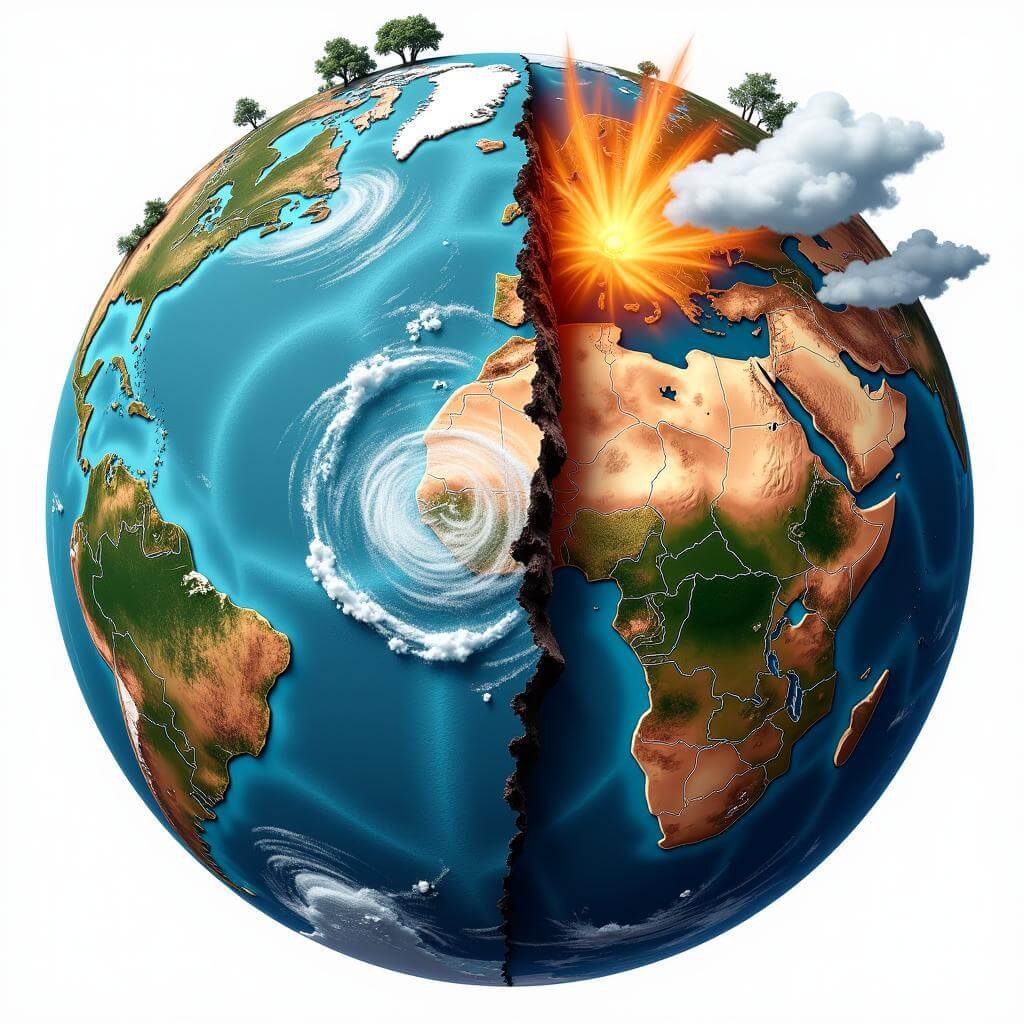Climate change and its effects on weather patterns is a topic of growing importance in IELTS Writing Task 2. Based on recent trends, this subject has appeared frequently in past exams and is likely to continue being a popular choice for future tests. Let’s examine a relevant question that has been featured in recent IELTS exams:
Climate change is having a significant impact on weather patterns around the world. What are the causes of these changes? What measures can governments and individuals take to reduce the effects of climate change?
This question touches on a critical global issue and requires candidates to discuss both the causes of climate change and potential solutions. Let’s analyze the question and provide sample essays for different band scores.
Question Analysis
This question has two main parts:
- Causes of climate change affecting weather patterns
- Measures to reduce climate change effects (by governments and individuals)
Candidates should address both aspects equally in their response, providing a balanced discussion of causes and solutions.
Sample Essay 1 (Band 8-9)
Climate change has become one of the most pressing issues of our time, with its impacts on global weather patterns becoming increasingly evident. This essay will explore the primary causes of these changes and discuss potential measures that both governments and individuals can take to mitigate the effects of climate change.
The main driver of climate change is the increased emission of greenhouse gases, particularly carbon dioxide, into the atmosphere. This is primarily due to human activities such as burning fossil fuels for energy production, deforestation, and industrial processes. These emissions trap heat in the Earth’s atmosphere, leading to a gradual increase in global temperatures. This warming trend disrupts established weather patterns, resulting in more frequent and severe extreme weather events such as hurricanes, droughts, and floods.
To address this global challenge, governments must take decisive action. One crucial step is to implement and enforce stricter regulations on industrial emissions, encouraging companies to adopt cleaner technologies and practices. Additionally, governments should invest heavily in renewable energy sources like solar, wind, and hydroelectric power to reduce reliance on fossil fuels. International cooperation is also essential, with agreements like the Paris Accord providing a framework for global action on climate change.
How climate change affects global water resources is another critical aspect that governments need to address through comprehensive water management policies and infrastructure improvements.
Individuals also have a significant role to play in combating climate change. Personal choices such as reducing energy consumption, using public transportation or electric vehicles, and adopting a plant-based diet can collectively make a substantial impact. Moreover, consumers can influence corporate behavior by supporting eco-friendly products and companies that prioritize sustainability.
Importance of public awareness in combating climate change cannot be overstated. Education and awareness campaigns can help individuals understand the urgency of the situation and motivate them to take action in their daily lives.
In conclusion, while the causes of climate change are complex and multifaceted, there are clear steps that both governments and individuals can take to address this global challenge. By combining strong policy measures with personal responsibility and international cooperation, we can work towards mitigating the effects of climate change on weather patterns and preserving a habitable planet for future generations.
 Climate change affecting global weather patterns
Climate change affecting global weather patterns
Sample Essay 2 (Band 6-7)
Climate change is causing big changes in weather all over the world. This essay will talk about why this is happening and what we can do about it.
The main reason for climate change is that humans are putting too much carbon dioxide and other gases into the air. This happens because we burn a lot of oil, coal, and gas for energy. Also, cutting down forests makes it worse because trees help clean the air. These gases trap heat and make the Earth warmer, which changes weather patterns.
Governments can help fix this problem in several ways. They can make laws to stop companies from polluting so much. They can also spend money on clean energy like solar and wind power. Countries need to work together too, because climate change affects everyone.
People can also do things to help. We can use less energy at home by turning off lights and using less air conditioning. Using public transport or bicycles instead of cars is good too. Eating less meat can also help because raising animals for food creates a lot of pollution.
How does climate change affect natural disaster frequency is an important question that shows why we need to act quickly. If we don’t, there might be more floods, storms, and droughts in the future.
In conclusion, climate change is a big problem that is changing our weather. Both governments and regular people need to work hard to solve it. If we all do our part, we can make things better for the future.
Sample Essay 3 (Band 5-6)
Climate change is making weather different everywhere. I will write about why this happens and what we can do.
The main reason for climate change is pollution. People and factories make too much dirty air. This air makes the Earth hot. When Earth gets hot, the weather changes.
Governments can help stop this. They can make rules so factories don’t make so much pollution. They can also use clean energy like sun and wind power. People in different countries should work together too.
Normal people can help too. We can use less electricity at home. We can walk or use buses instead of cars. Eating less meat is also good for the Earth.
How does climate change affect international relations shows that this problem is important for everyone in the world.
To finish, climate change is bad for our weather. Everyone needs to help fix it. If we try hard, we can make the Earth better.
Explanation of Band Scores
Band 8-9 Essay:
- Fully addresses all parts of the task with a well-developed response
- Presents a clear position throughout the response
- Uses a wide range of vocabulary with very natural and sophisticated control of lexical features
- Uses a wide range of structures with full flexibility and accuracy
- Presents ideas coherently and cohesively using a variety of cohesive devices
Band 6-7 Essay:
- Addresses all parts of the task, though some parts may be more fully covered than others
- Presents a relevant position, though conclusions may become unclear or repetitive
- Uses an adequate range of vocabulary for the task with some evidence of style and flexibility
- Uses a mix of simple and complex sentence forms
- Arranges information coherently and there is clear overall progression
Band 5-6 Essay:
- Addresses the task only partially; format may be inappropriate in places
- Expresses a position but development is not always clear
- Uses limited range of vocabulary; attempts to use less common words but with some inaccuracy
- Uses only a limited range of structures with only rare use of subordinate clauses
- Presents information with some organization but there may be lack of overall progression
Key Vocabulary to Remember
- Climate change (noun) /ˈklaɪmət tʃeɪndʒ/ – Long-term alteration of temperature and typical weather patterns in a place
- Greenhouse gases (noun) /ˈɡriːnhaʊs ˌɡæsɪz/ – Gases that contribute to the greenhouse effect by absorbing infrared radiation
- Mitigate (verb) /ˈmɪtɪɡeɪt/ – Make less severe, serious, or painful
- Renewable energy (noun) /rɪˈnjuːəbəl ˈenədʒi/ – Energy from a source that is not depleted when used
- Sustainability (noun) /səˌsteɪnəˈbɪləti/ – The ability to maintain at a certain rate or level
- Deforestation (noun) /diːˌfɒrɪˈsteɪʃən/ – The action of clearing a wide area of trees
- Emissions (noun) /ɪˈmɪʃənz/ – The production and discharge of something, especially gas or radiation
- Extreme weather (noun) /ɪkˈstriːm ˈweðə/ – Weather events that are rare for the place where they occur
- Carbon footprint (noun) /ˈkɑːbən ˈfʊtprɪnt/ – The amount of carbon dioxide released into the atmosphere as a result of one’s activities
- Biodiversity (noun) /ˌbaɪəʊdaɪˈvɜːsəti/ – The variety of plant and animal life in the world or in a particular habitat
In conclusion, the topic of climate change and its effects on weather patterns is likely to remain a significant issue in IELTS Writing Task 2. Candidates should be prepared to discuss causes, impacts, and potential solutions. Some potential future questions might include:
- How does climate change affect agriculture and food security?
- What role can technology play in addressing climate change?
- How can developing countries balance economic growth with environmental protection?
Role of space exploration in addressing climate issues is another interesting angle that might appear in future IELTS questions, highlighting the interconnectedness of various scientific fields in tackling global challenges.
To improve your writing skills, try composing your own essay on this topic and share it in the comments section for feedback and discussion. This active practice will help you develop your ideas and improve your ability to articulate complex thoughts on climate change and its impacts.


